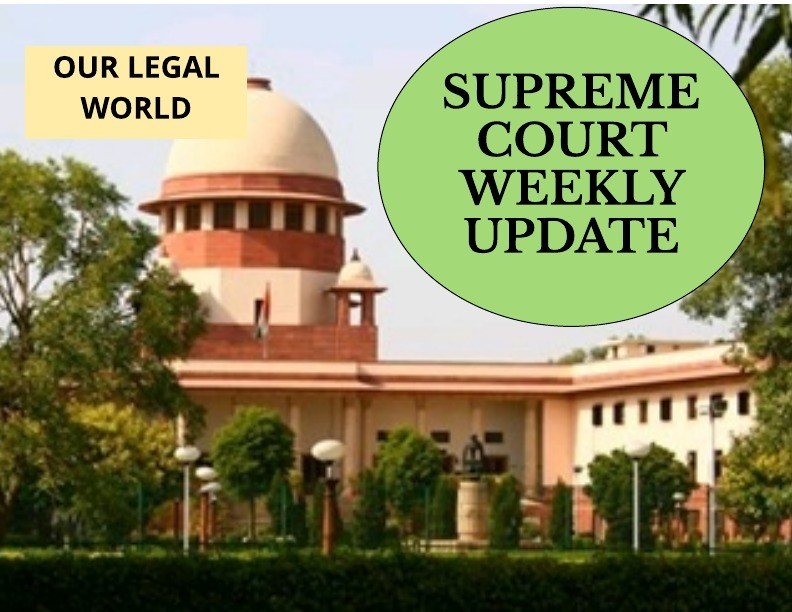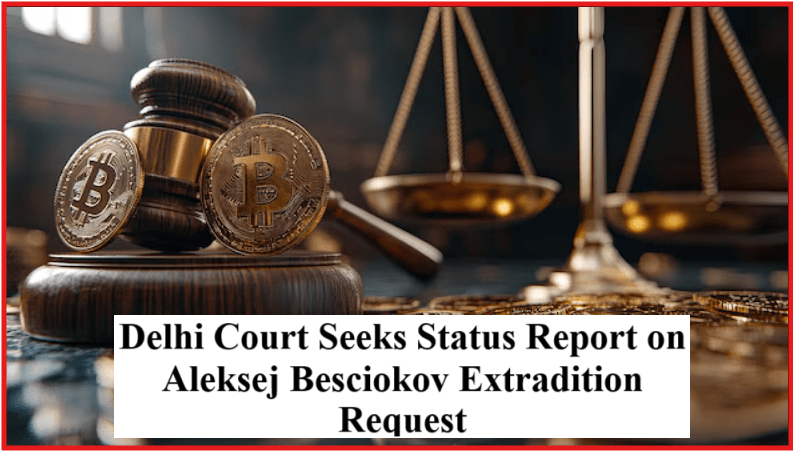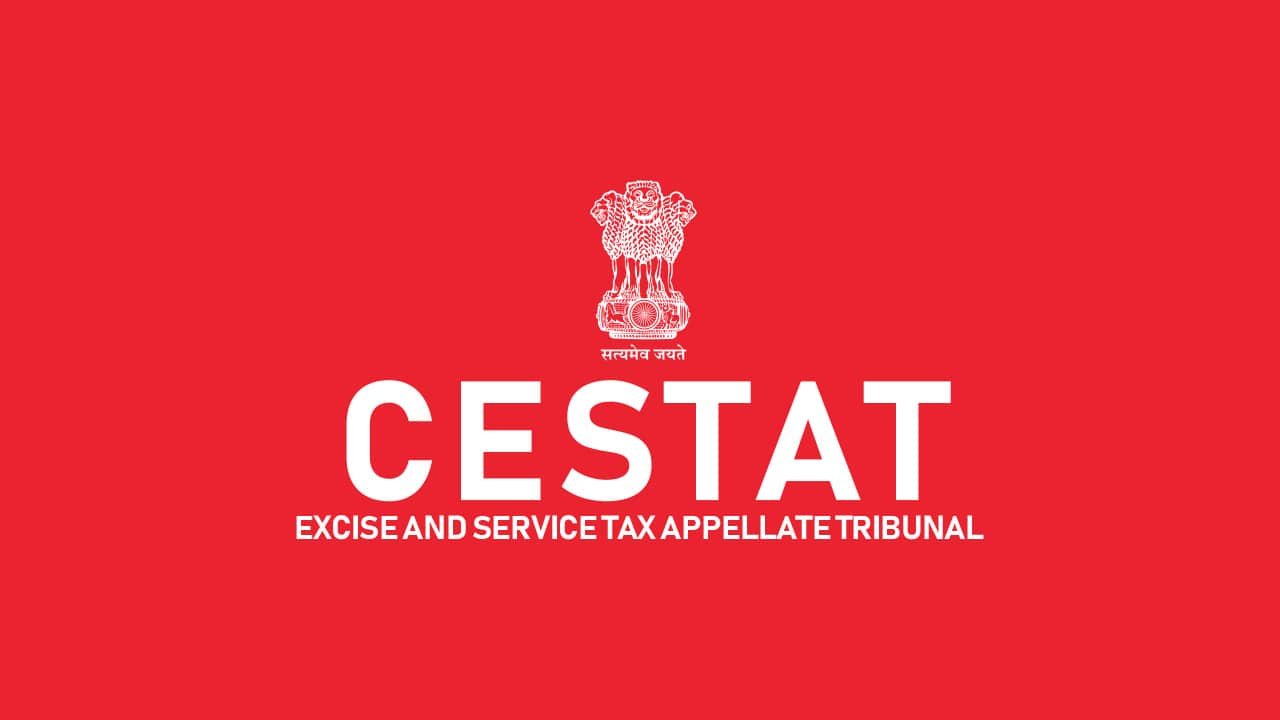Supreme Court Weekly 1-13 May, 2019
1. Poonam Bai V. State of Chhatisgarh
A Dying Declaration Is Not Invalid Merely Because It Was Not Certified By A Doctor
The Bench of Supreme Court comprising of Justice N.V.Ramana, Justice Mohan.M.Shantanagoudar and Justice S. Abdul Nazeer
2. Rashmi Chopra vs. State of UP
Section 498A IPC: Complaint Need Not Be Filed By The Woman Subjected To Cruelty Herself
The Supreme Court held that the Section 498A of the Indian Penal Code does not contemplate that complaint for offence under Section 498A should be filed only by women, who is subjected to cruelty by husband or his relative.
3. Rajbir Surajbhan Singh V. Chairman, IBPS Mumbai
Writ Petition Not Maintainable Against Institute of Banking Personnel Selection (IBPS)
The Supreme Court held that the Institute of Banking Personnel Selection (IBPS) is not a ‘State’ and thus not amenable to writ jurisdiction of the High Court or the Supreme Court. Upholding the Bombay High Court judgment, the bench comprising Justice L. Nageswara Rao and Justice MR Shah observed that conducting recruitment tests for appointment in banking and other financial institutions, is not a public duty.
4. Ganesan V. The commissioner, TN Hindu Religious and Charitable Endowments Board
The Supreme Court observed that the suits, appeals and applications referred to in the Limitation Act, 1963 are suits, appeals and applications which are to be filed in a Court, and not before a statutory authority. The bench comprising Justice Ashok Bhushan and Justice KM Joseph held that the ‘Commissioner’ under Hindu Religious Endowment Charitable Act, 1959 while hearing the appeal under Section 69 of Act, is not a ‘Court’ within the meaning of the Limitation Act.
5. Hindustan Sanitaryware and Industries Ltd. V. The State of Haryana
The Supreme Court held that the categorization of unskilled employees as semiskilled and semi-skilled as skilled on the basis of their experience in the notification issued for fixing/revising the minimum rates of wages is beyond jurisdiction of Government.
6. S. K. Miglant V. State NCT of Delhi
7. N. Ramamurthy V. State
The Supreme Court set aside a High Court judgment which applied principles governing suspension of conviction to reject a plea seeking suspension of execution of sentence. The Apex Court bench comprising Justice Abhay Manohar Sapre and Justice Dinesh Maheshwari observed that the High Court erred in observing that sentence comes to 45 years of imprisonment. It noted that the sentences were ordered to run concurrently by the Trial Court and hence, the maximum period of imprisonment is 7 years apart from certain default stipulations, which would come in operation only if the fine is not paid.
8. Union of India V. Dharam Pal
The Supreme Court observed that solitary confinement of a person sentenced to death prior to the rejection of mercy petition is palpably illegal. The bench comprising Justice NV Ramana, Justice Mohan M. Shantanagoudar and Justice S. Abdul Nazeer upheld the Punjab and Haryana High Court judgment that had commuted death sentence awarded to a murder accused whose mercy petition was rejected by the President of India in 2013.
9. Federation of Obstetrics and Gynecological Societies of India V. Union of India
The Supreme Court upheld the Constitutional Validity of Sections 23(1) and 23(2) of the Pre-conception and Pre-natal Diagnostic Techniques (Prohibition of Sex Selection) Act, 1994 .
10. Federation of Obstetrics and Gynecological Societies of India V. Union of India
The Supreme Court observed that giving preference to male child is violative of Article 39A of the constitution and against mandate of Article 51A (e) which casts a Constitutional duty on citizens to renounce practices derogatory to the dignity of women. While upholding the constitutional validity of Section 23 of the Pre-conception and Pre-natal Diagnostic Techniques (Prohibition of Sex Selection) Act, 1994, the bench comprising Justice Arun Mishra and Justice Vineet Saran observed that that female foeticide is most inhumane,immoral and anti-social act.
11. Bhivchandra Shankar More vs. Balu Gangaram More
The Supreme Court observed that the right of appeal under Section 96(2) CPC is a statutory right and the defendant cannot be deprived of the statutory right of appeal merely on the ground that the application filed by him under Order IX Rule 13 CPC [to set aside ex-parte decree] has been dismissed.
Writ Of Habeas Corpus Can Be Issued When The Detention Of A Minor Is By A Person Who Is Not Entitled To His Legal Custody
12. Beemaneni Maha Lakshmi vs. Gangumalla Appa Rao
Specific Performance: Plea Of Hardship Cannot Be Raised If Not Pleaded In Written Statement
13. Lal Bahadur Gautam V. State of U.P.
Everyone has to be responsible and careful in what they present to the Court, said the Supreme Court while reiterating that a lawyer demeans himself if he acts merely as a mouthpiece of his client. This observation was made by a bench comprising Justice Arun Mishra and Justice Navin Sinha on Wednesday while allowing an appeal filed by a lecturer in a private unaided college affiliated to the Chaudhary Charan Singh University.
14. Sasikala Pushpa V. State of Tamil Nadu
The Supreme Court quashed a criminal case lodged against expelled AIADMK Leader and Member of Parliament Sasikala Pushpa and her husband with respect to the alleged forgery committed by them in signing the Vakalatnama.
15. SBI V M/s Jah Developers Pvt. LtdThe Supreme Court observed that a borrower has no right to be represented by a lawyer before the In-House Committee of banks constituted for the purpose of determining whether he is a willful defaulter or not. The bench comprising Justice Rohinton Fali Nariman and Justice Vineet Saran set aside a Delhi High Court judgment that held that a lawyer has the right to represent his client before such in-house committees.
16. Karnataka Housing Board V. K.A. Nagamani
The Supreme Court held that a Revision Petition before the National Consumer Disputes Redressal Commission [NCDRC] is not maintainable against an order passed by the State Consumer Commission in execution proceedings. The bench comprising Justice UU Lalit and Justice Indu Malhotra observed that orders passed for enforcement of the final order in the Consumer dispute, cannot be construed to be orders passed in the ‘consumer dispute’.
17. B K Pavitra V. Union of India
The Supreme Court upheld the Constitutional validity of the Karnataka Extension of Consequential Seniority to Government Servants Promoted on the Basis of Reservation (to the Posts in the Civil Services of the State) Act 2018. The said enactment provided for consequential seniority to persons belonging to the Scheduled Castes and Scheduled Tribes promoted under the reservation policy of the State of Karnataka.
18. B K Pavitra V. Union of India
In its judgment upholding the 2018 Karnataka Law granting reservation in promotion for staffs belonging to Scheduled-Caste and Scheduled-Tribe communities, the Supreme Court observed SC-ST Reservations are the true fulfilment of effective and substantive equality by accounting for the structural conditions into which people are born.
Also Read: Relationship between Fundamental Rights and Directive Principles of State Policy









